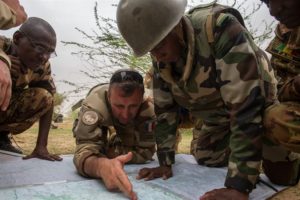By Pramod Raj Sedhain.
French military presence in Africa is not new, it has been engaged in various military operations across the region. But “Operation Barkhane” has different counter-terrorism operations with a regional scope. It was launched on August 1, 2014 aimed at stabilizing the region has a French pillar of counter-terrorism in Africa’s Sahel-Sahara region. This operation came after the successful “Operation Serval” military intervention in Mali in 2013 which helped in flushing out radical militant group Ansar Dine from large territories in Mali.
“Operation Barkhane” is not only the successor of popular “Operation Serval” but is also a new regional operation. Former French colonies “G5 Sahel” – such as Burkina Faso, Chad, Mali, Mauritania & Niger involve joint counter-terrorism operation. Senegal and other regional countries also support this mission. French has deployed around 35,00 soldiers in five permanent locations among special-forces base in Burkina Faso’s capital Ouagadougou and an intelligence base in Niger’s capital Niamey. Niamey is also a crucial drone intelligence gathering base across the region.
Open sources data show that the French has deployed 6 fighter jets, 17 helicopters, 5 drones, 10 transport aircrafts, 200 armored vehicles and 200 logistic vehicles. Such equipment cannot be enough to secure or monitor the large region. Interestingly, the operation area is 9 times larger than France or even larger than the size of Europe.
Despite effective command and communication structure, the ongoing operation faces various crucial problems such as non-motivated underequipped ally armies, porous borders, vast desert areas, harsh terrain, vast ungoverned areas monitoring with very limited tolls, lack of logistics, lack of air supports and quick operational support, lack of necessary equipment and maintenance, difficult climate, among others.
The situation on the ground is region still chaotic. Al-Qaeda in the Islamic Maghreb (AQIM) has broader regional footholds which has links with local radical groups from North Africa to Western Africa. AQIM goals are not only limited to Maghreb but are able to attack Iberian Peninsula to whole Europe. They are also capable in footholds to operational cells in various nations. They have been able to rapidly transform their operational base. The group’s source of funding and recruitment remains strong. So far, AQIM remains incapable of attacking Western Europe but possibilities of following AQAP-style international threat in near future cannot be ruled out.
AQIM’s guerilla-style attacks, mine warfare, suicide bombings, assassinations, kidnapping, indiscriminate attacks and other terrorist tactics continue to harass the security forces. Various high profile attacks in regional countries as well as the sharp growing militant attacks in Northern Mali highlights the future regional terrorism threats. Counter-terrorism campaign cannot be successful through military means alone. It requires broader social, political and economic programs to sustain security success.
Apart from AQIM and Islamic State (IS) linked threats, there are several other jihadist factions as well, which are connected with organized criminal gangs. Large number of Sahara and Sahel countries are fighting alongside with IS Iraq and Syria which could create problems leading to regional stability in future. After IS lost the ground, they could join regional groups like AQIM. Various active drugs and arms dealers engaged in facilitating and connecting with terrorist groups remain a threat for regional stability.
Collaboration with U.S. essential
More considerable measures are necessary for long-term counterterrorism efforts in Africa. The United States, which provided causal intelligence & logistic support on French Mali operation in 2013, must not sideline itself from “Operation Barkhane”. This operation can be transferred to U.S. leadership for broader participation of NATO countries for regional stability. French alone cannot resolve the crisis in terms of financial as well operational military equipment.
U.S. has been engaged in ‘low profile’ close counter-terrorism cooperation in over two dozen countries in Africa. U.S. forces have been very actively engaged in “covert war” against global terrorist networks in the region. The U.S. has been heavily supporting regional wars against terrorism in Somalia and Nigeria as well and has engaged itself in capacity building, logistic assistance, training for counter-narcotics and cross border crime operations.
There are dozens of US military installations in Africa with disclosed and undisclosed sites for counterterrorism efforts, surveillances, security cooperation in various militaries to strength their capabilities. They play crucial logistic, training, and advise support for regional war against terrorism. Without strengthening regional countries’ military capabilities and necessary equipment, further war would be difficult.
Growing western security presence in Africa can provide the hope for regional stability in the volatile continent. However, it requires additional coordination with a broader regional engagement. Western presence in Africa is obliged for regional stability and to prevent potential threat of future consequences. Sometimes beyond the counterterrorism mission foreign military intervention requires to protect state authority to prevent humanitarian catastrophe. Western forces’ can play role in preventing massacres by some dictators in the African region. The U.S., E.U. and African trilateral new defense cooperation could lead to an effective measure for long-term counter terrorism effort to ensuring regional stability.



